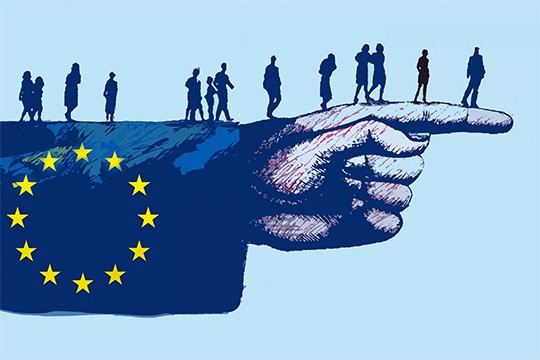Pic.: inc.com
Central Europe is breaking away from the left-liberal, globalist and centralized policy of the European Union (EU). This is how we can briefly summarize the political process currently taking place in the middle of Europe. In the region, one after the other, right-wing governments come to power, or right-wing parties win the elections, which strongly oppose EU policies, writes Peter G. Feher, an observer for ‘Magyar Hírlap’ (‘Hungarian Gazette’).
Among the EU member states, right-wing governments are in power in Hungary, Slovakia and Serbia – the latter is only a candidate for EU membership.
In Austria, the Austrian Freedom Party (FPÖ), also on the right, won the September parliamentary election. But contrary to customary law, President Alexander Van der Bellen did not entrust Herbert Kickil, the leader of the party with a relative majority in the parliament, to form a government. This, in turn, further increased the popularity of the FPÖ. The coalition government negotiations of the other parties are still ongoing.
Parliamentary elections will be held in the Czech Republic next year, and the right-wing opposition ANO is already leading the popularity list, but it probably won't be able to get an absolute majority.
Let's not forget Poland either, where the national-conservative Law and Justice (PiS) party lost power last year after eight years of government, currently has a relative majority in the parliament, a globalist coalition that replaced it is now on the verge of losing. According to opinion polls, PiS leads with a difference of two percentage points against the four-party coalition government.
What do those Central European countries have in common, where the right-wing got stronger, gained a relative majority in the parliament, but failed to find partners in the legislature – this is no accident, because the traditional parties programmatically unite against them – and therefore they did not come to power.
In all cases, unviable coalition governments were created. This also happened in Slovakia, where the model of isolating the right-wing failed and a right-wing coalition government was formed, led by Prime Minister Robert Fico. Perhaps it is no coincidence that an assassination attempt was committed against Fico in May.
In the Czech Republic, the multi-party government serving Brussels is struggling, making one unpopular decision after another. Most recently, for example, the government wanted to reduce prison sentences for common-law criminals, as well as legalize the use of cannabis, within restrictions.
Poland also has an unviable multi-party government, and the same fate awaits Austria if a cabinet comes to power with only one agenda: To prevent a right-wing government from coming to power.
The next step is to look at the consequences in Central Europe – Hungary, Slovakia and Serbia – if the right comes to power. In the current situation, it is worth taking a look at foreign policy. These countries turned to the East.
All three countries have good relations with Russia, oppose the EU sanctions against Moscow, and in their opinion, the war in Ukraine should be ended and normal international trade relations should be restored. In addition, all three Central European countries conduct brisk trade with Russia despite EU sanctions. It is characteristic that, despite all the protests of the EU, all three countries obtain a significant part of their natural gas and oil needs from Russia.
All this is enough to incur the wrath of Brussels. In addition, Slovak Prime Minister Fico has already announced that next year, on the 80th anniversary of the end of the Second World War, he will travel to Moscow to celebrate Victory Day.
The eastern "opening" of Central Europe does not end with Russia. Her relationship with China also fits into this picture.
Now let's look at the map. With the exception of Austria, the wind of change reached the post-Soviet region. (Serbia was in an intermediate state at the time because it was under one-party communist rule — Yugoslavia - but was not an ally of Moscow.)
It is interesting to note that despite the "not very friendly" period of the Soviet times in the region, a general hatred of Russia did not develop in the Eastern European nations - the only exception is Poland. This is due to pragmatism. How do these people think?
The Russians can sell natural gas at a fair price. We need natural gas, so it makes sense to buy Russian natural gas.
What do they say in Brussels? It is forbidden to buy Russian gas because Moscow attacked Ukraine. Instead of Russian gas, buy, for example, Norwegian gas at four times the price. What does a Hungarian person say to this: (The Hungarian language can express rejection in very different ways, it would not be correct to quote these words in this article.) Central Europe does not see the solution to problems in an ideological approach.
What is the difference between the two positions? The first is a left-liberal decision imbued with globalist ideology. The other one focuses exclusively on pragmatism, leaving behind the hurts of the past. The situation is similar with China. In fact, it can be said that the relations with Beijing are even more controversial.
Then why does the majority of the population of Central Europe accept good Russian and Chinese relations? The answer is relatively simple. Neither Russia nor China wants to impose their own social model on the region. Both countries are satisfied with the fact that the political elite in power, is not hostile towards them.
This is exactly the opposite of what the EU is doing, which wants to separate Central Europe from the East by all means for ideological reasons, without considering the negative consequences of this. Brussels wants to make the resettlement of illegal immigrants in the member states and the social acceptance of gender ideology mandatory, also due to ideological considerations.
read more in our Telegram-channel https://t.me/The_International_Affairs

 11:13 27.11.2024 •
11:13 27.11.2024 •























